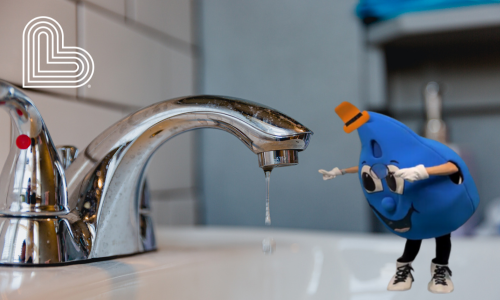
A leak is a loss
Leaking oil from your car, air from a tire, or water from your faucet– there are no good leaks!
Did you know?

According to the EPA, minor water leaks (such as a dripping sink or running toilet) can, combined, waste more than one trillion gallons of water each year in the U.S.! Curious how drips can add up to gallons wasted? Try out the drip calculator HERE.
We tend to take clean water for granted and expect it to be there every time we turn on the faucet. But water is a precious resource that we need to protect.
Water leaks in your home may be the biggest waste of this essential resource. Although common, household water leaks don’t have to be wasteful if found and fixed in a timely manner. The most common causes are faucets, toilets, showerheads, and irrigation systems. These leaks may go undetected for long periods, often until damage occurs or you get a big water bill.
Here are some tips to help catch and stop water leaks in their tracks:
- Check your water bill. Is there a spike in usage but no changes in your water use or the number of people in your household? A family of four typically won’t exceed 12,000 gallons of water per month (in the winter without irrigation). If your usage has suddenly increased, it may be a result of a leak.
- Read your water meter. First, take a base reading, then avoid using any water for the next two hours. After two hours, read the meter again. If water usage has increased, this may mean you have a leak. Some meters have leak detection built-in
- Test your toilet. Toilet leaks are some of the hardest to detect. Put food coloring or a dye tablet in the tank of your toilet and let it sit for 10 minutes. If color shows up in the toilet bowl, its got a leak. Don’t forget to flush after the test so the dye doesn’t stain.
- If you have an AMI meter, download the EyeOnWater app, a free tool that shows your water use by the hour. Set up leak alerts and the app will tell you about a leak before it’s done any damage – to your house or your wallet! (EAST ONLY)
Not all leaks are obvious, so we have tools to help you become a leak detective. Download our checklist at the button below to help track down a variety of leaks that may be hiding in your home.
You have the power to stop the leaks, saving your home from damage and reducing water waste. You may be able to fix some leaks yourself, such as replacing the flapper in your toilet or tightening the bathtub faucet, but other repairs may require the help of a licensed plumber. Either way, while March 17-23, 2025, is observed as Fix-a-Leak Week, leak detection and resolution can be done year-round.

